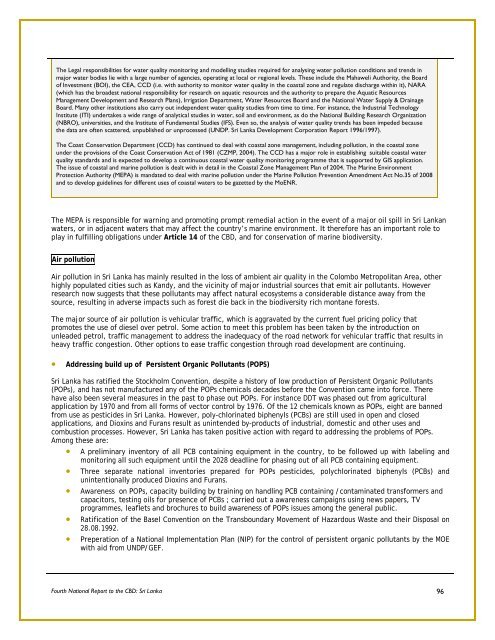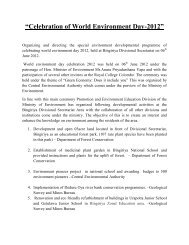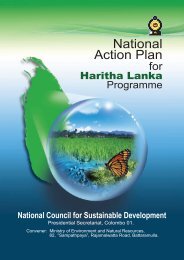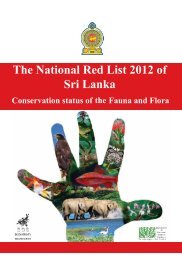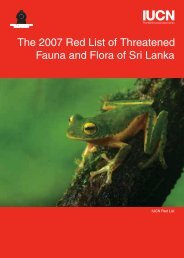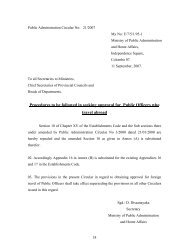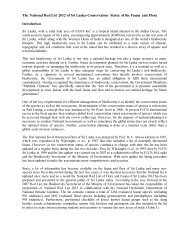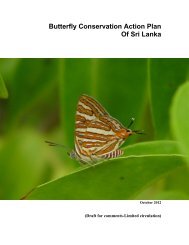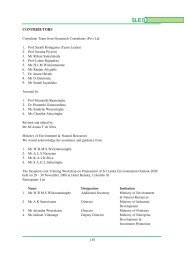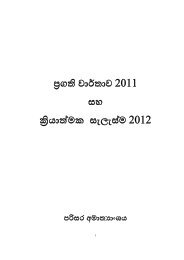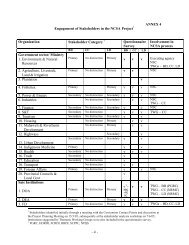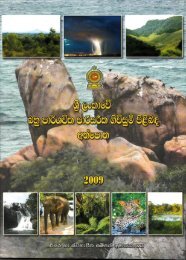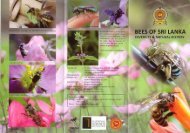English - Convention on Biological Diversity
English - Convention on Biological Diversity
English - Convention on Biological Diversity
Create successful ePaper yourself
Turn your PDF publications into a flip-book with our unique Google optimized e-Paper software.
The Legal resp<strong>on</strong>sibilities for water quality m<strong>on</strong>itoring and modelling studies required for analysing water polluti<strong>on</strong> c<strong>on</strong>diti<strong>on</strong>s and trends inmajor water bodies lie with a large number of agencies, operating at local or regi<strong>on</strong>al levels. These include the Mahaweli Authority, the Boardof Investment (BOI), the CEA, CCD (i.e. with authority to m<strong>on</strong>itor water quality in the coastal z<strong>on</strong>e and regulate discharge within it), NARA(which has the broadest nati<strong>on</strong>al resp<strong>on</strong>sibility for research <strong>on</strong> aquatic resources and the authority to prepare the Aquatic ResourcesManagement Development and Research Plans), Irrigati<strong>on</strong> Department, Water Resources Board and the Nati<strong>on</strong>al Water Supply & DrainageBoard. Many other instituti<strong>on</strong>s also carry out independent water quality studies from time to time. For instance, the Industrial TechnologyInstitute (ITI) undertakes a wide range of analytical studies in water, soil and envir<strong>on</strong>ment, as do the Nati<strong>on</strong>al Building Research Organizati<strong>on</strong>(NBRO), universities, and the Institute of Fundamental Studies (IFS). Even so, the analysis of water quality trends has been impeded becausethe data are often scattered, unpublished or unprocessed (UNDP. Sri Lanka Development Corporati<strong>on</strong> Report 1996/1997).The Coast C<strong>on</strong>servati<strong>on</strong> Department (CCD) has c<strong>on</strong>tinued to deal with coastal z<strong>on</strong>e management, including polluti<strong>on</strong>, in the coastal z<strong>on</strong>eunder the provisi<strong>on</strong>s of the Coast C<strong>on</strong>servati<strong>on</strong> Act of 1981 (CZMP, 2004). The CCD has a major role in establishing suitable coastal waterquality standards and is expected to develop a c<strong>on</strong>tinuous coastal water quality m<strong>on</strong>itoring programme that is supported by GIS applicati<strong>on</strong>.The issue of coastal and marine polluti<strong>on</strong> is dealt with in detail in the Coastal Z<strong>on</strong>e Management Plan of 2004. The Marine Envir<strong>on</strong>mentProtecti<strong>on</strong> Authority (MEPA) is mandated to deal with marine polluti<strong>on</strong> under the Marine Polluti<strong>on</strong> Preventi<strong>on</strong> Amendment Act No.35 of 2008and to develop guidelines for different uses of coastal waters to be gazetted by the MoENR.The MEPA is resp<strong>on</strong>sible for warning and promoting prompt remedial acti<strong>on</strong> in the event of a major oil spill in Sri Lankanwaters, or in adjacent waters that may affect the country’s marine envir<strong>on</strong>ment. It therefore has an important role toplay in fulfilling obligati<strong>on</strong>s under Article 14 of the CBD, and for c<strong>on</strong>servati<strong>on</strong> of marine biodiversity.Air polluti<strong>on</strong>Air polluti<strong>on</strong> in Sri Lanka has mainly resulted in the loss of ambient air quality in the Colombo Metropolitan Area, otherhighly populated cities such as Kandy, and the vicinity of major industrial sources that emit air pollutants. Howeverresearch now suggests that these pollutants may affect natural ecosystems a c<strong>on</strong>siderable distance away from thesource, resulting in adverse impacts such as forest die back in the biodiversity rich m<strong>on</strong>tane forests.The major source of air polluti<strong>on</strong> is vehicular traffic, which is aggravated by the current fuel pricing policy thatpromotes the use of diesel over petrol. Some acti<strong>on</strong> to meet this problem has been taken by the introducti<strong>on</strong> <strong>on</strong>unleaded petrol, traffic management to address the inadequacy of the road network for vehicular traffic that results inheavy traffic c<strong>on</strong>gesti<strong>on</strong>. Other opti<strong>on</strong>s to ease traffic c<strong>on</strong>gesti<strong>on</strong> through road development are c<strong>on</strong>tinuing.• Addressing build up of Persistent Organic Pollutants (POPS)Sri Lanka has ratified the Stockholm <str<strong>on</strong>g>C<strong>on</strong>venti<strong>on</strong></str<strong>on</strong>g>, despite a history of low producti<strong>on</strong> of Persistent Organic Pollutants(POPs), and has not manufactured any of the POPs chemicals decades before the <str<strong>on</strong>g>C<strong>on</strong>venti<strong>on</strong></str<strong>on</strong>g> came into force. Therehave also been several measures in the past to phase out POPs. For instance DDT was phased out from agriculturalapplicati<strong>on</strong> by 1970 and from all forms of vector c<strong>on</strong>trol by 1976. Of the 12 chemicals known as POPs, eight are bannedfrom use as pesticides in Sri Lanka. However, poly-chlorinated biphenyls (PCBs) are still used in open and closedapplicati<strong>on</strong>s, and Dioxins and Furans result as unintended by-products of industrial, domestic and other uses andcombusti<strong>on</strong> processes. However, Sri Lanka has taken positive acti<strong>on</strong> with regard to addressing the problems of POPs.Am<strong>on</strong>g these are:• A preliminary inventory of all PCB c<strong>on</strong>taining equipment in the country, to be followed up with labeling andm<strong>on</strong>itoring all such equipment until the 2028 deadline for phasing out of all PCB c<strong>on</strong>taining equipment.• Three separate nati<strong>on</strong>al inventories prepared for POPs pesticides, polychlorinated biphenyls (PCBs) andunintenti<strong>on</strong>ally produced Dioxins and Furans.• Awareness <strong>on</strong> POPs, capacity building by training <strong>on</strong> handling PCB c<strong>on</strong>taining /c<strong>on</strong>taminated transformers andcapacitors, testing oils for presence of PCBs ; carried out a awareness campaigns using news papers, TVprogrammes, leaflets and brochures to build awareness of POPs issues am<strong>on</strong>g the general public.• Ratificati<strong>on</strong> of the Basel <str<strong>on</strong>g>C<strong>on</strong>venti<strong>on</strong></str<strong>on</strong>g> <strong>on</strong> the Transboundary Movement of Hazardous Waste and their Disposal <strong>on</strong>28.08.1992.• Preperati<strong>on</strong> of a Nati<strong>on</strong>al Implementati<strong>on</strong> Plan (NIP) for the c<strong>on</strong>trol of persistent organic pollutants by the MOEwith aid from UNDP/GEF.PpFourth Nati<strong>on</strong>al Report to the CBD: Sri Lanka 96


